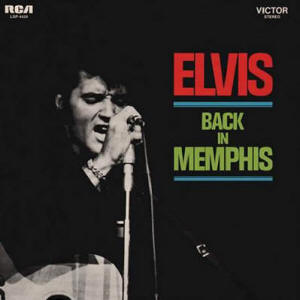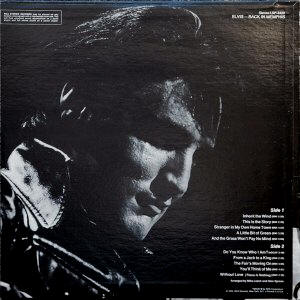Verdict
Without doubt "Back In Memphis" is a strong album, but it's not as good as "From Elvis In Memphis".
![]()
(C) RCA Records
The ultimate site about the king of the analogue age


In November 1970 RCA Victor deleted the double album "From Memphis To Vegas / From Vegas To Memphis" and released the tracks on two separate longplayers instead. Neither one made it on Billboard's "Top LPs Chart", but there was a constant request and the label kept them in the catalogue.
In 2016 the complete Presley catalogue was restored and remastered by Vic Anesini for a boxed set of 60 compact discs called "The Album Collection". Sony Music Entertainment provides the streaming platforms with the same versions of the individual albums (some of them offering bonus tracks), albeit in 24 bit/90 khz flac. That means, if the platform of your choice supports high resolution audio, you can enjoy the tracks in the same quality Sony used to scan and master them. On Spotify, which has a market share of approximately 30% and is the only platform that publishes streaming figures, "Back In Memphis" accumulates 9.5 million streams with 4,000 requests per day. So it's still not a popular release.
The album was produced in two sessions at the American Sound Studio in Memphis/Tennessee. The first period of recording lasted from January 13th to 22nd, the second one from February 17th to 22nd. The sessions were produced by Chips Moman (American) and Felton Jarvis (RCA) and engineered by Roy Shockley (American) and Al Pachucki (RCA). The band consisted of Reggie Young (guitar & sitar), Tommy Cogbill (bass), Mike Leech (bass), Gene Chrisman (drums), Bobby Wood (piano), Bobby Emmons (organ), John Hughey (steel guitar) and Ed Kollis (harmonica). Between January 22nd and May 7th further instruments and harmony voices were added. The first bunch of the recordings had been released on the album "From Elvis In Memphis". At the time Chips Moman was upset, that Elvis had agreed to release the majority of the remaining tracks on a second longplayer. His concept of recording was to produce a collection of songs, select the best ones for the album and file away the others. To him "Back In Memphis" was nothing but a compilation of second-rate leftovers.
In 2012 Follow That Dream Records released a collector's edition of "Back In Memphis". For a review tap HERE.
Inherit The Wind
The singer warns an unspecified lady to fall in love with him, because he would leave her after a while anyway. It's a nice, uptempo popsong. Not something you might find on the charts, but certainly a good album track. The music was recorded on February 15, 1969, Elvis' vocals were added on January 21st. Later harmony vocals (January 24th), strings (May 5th) and horns (May 6th) were added. By the way: The song was written by Eddie Rabbit.
This Is The StoryThe ballad was recorded on January 13, 1969 within just two takes. But the king was not satisfied by the result and re-recorded his part on January 21st. Three days later Chips Moman added harmony vocals, later the recording was enhanced with strings (May 5th) and horns (May 6th). "This Is The Story" was written by Chris Arnold, Geoff Morrow and David Martin, who also had written "Let's Be Friends" for the movie "Change Of Habit". The narrator was left and looks back at his releationship, full of self-pity. Elvis sings very well and even adds a touch of soul to his performance.
Stranger In My Own HometownThe cover of Percy Mayfield's "Stranger In My Own Hometown" is not just one of the highlights of this album, but also one of the highlights of the Presley canon. The king and his crew obviously have fun, you really can hear their pure joy of performing. On February 17, 1969 the song was rehearsed and recorded in a single take. On May 7th harmony vocals, strings and horns were added. The performance also features a sitar, which is very unusual for Elvis.
A Little Bit Of GreenThe narrator was left and feels quite jealous when he sees his ex with her new lover. This is another song by Arnold/Morrow/Martin. Elvis didn't need much time to tape "A Little Bit Of Green". On January 14, 1969 he was done within just three takes. Much later, on September 26th, he re-recorded his part and also had Charlie Hodge add some harmony vocals.
And The Grass Won't Pay No MindIn January 1969 the American Sound Studio originally had been booked by Neil Diamond. He let Elvis go first, but obliged him to record one of his songs. The king selected "And The Grass Won't Pay No Mind", which was an unusual step for him. The lyrics are surprisingly frank, the song is simply about having sex on the lawn! Elvis recorded the ballad on February 17, 1969 and selected the 6th attempt for post-production. On February 22nd he taped some vocal repairs, on May 7th strings and horns were added.
Do You Know Who I AmFor me this ballad, written by Bobby Russell, is another highlight. After a long time the narrator meets his ex by coincidence and asks her, if she remembers him. The lyrics just reveal the singer's part of the conversation, so the listener has to figure out the answers of the lady. Elvis' voice is full of emotion and his sadness and slight hope for a reconciliation are tangible. On February 18, 1969 Elvis recorded seven takes of "Do You Know Who I Am". Four days later he re-recorded the last part of the song (starting with "...do you think there's a chance") and also added his harmony vocals. The production was finalized on March 25th with the addition of strings.
From A Jack To A KingIt is said that "From A Jack To A King" was a favorite of Vernon Presley and when Elvis intoned the song for fun, it was decided to record it. This happened on January 21, 1969 within five takes. The harmony vocals were added on January 24th, horns and strings followed on May 7th. Besides that Chips Moman replaced the part between 2:04 and 2:07 (the line "you made me king of your heart") with the same line, that appeared earlier in the song. Elvis singing as well as his guitar playing sounds high spirited, which gives the impression of a jam. However, the harmony vocals sound somewhat strange, almost ridiculous in places. "From A Jack To A King" was written and recorded by Ned Miller in 1957, but the success came with his re-recording five years later. In 1962 he scored a hit with the song on the "Hot 100" as well as on the "Hot Country Singles Chart".
The Fair Is Moving OnThe ballad was already known from the b-side of "Clean Up Your Own Backyard". Elvis taped the track on February 21, 1969 within a single take, but re-recorded his part on the next day. On March 25th harmony vocals and strings were added. The narrator works on a fair and has to move on, but promises his girl to be back soon. The song by Guy Fletcher and Doug Flett is somewhat saccarine, but I like it very much.
You'll Think Of MeIn the early 1960s Mort Shuman and Doc Pomus had delivered a few outstanding songs, now Elvis was recording one of Shuman's compositions again. The narrator tells his lady, that he won't be faithful and will certainly leave her someday. The king manages the trick to deliver the cynical asshole-lyrics in a warm-hearted and sensitive way. The contrast of the lyrics and the music and vocal performance is just great. I like "You'll Think Of Me" very much. Elvis recorded it on January 14, 1969 at American Sound Studio within 23 takes. The track also features a sitar, which is very unusual for the king. On January 21st Elvis re-recorded his vocals, three days later harmony vocals were added. On May 5th and 6th the track was further enhanced with strings and horns. In August 1969 RCA released "You'll Think Of Me" on the b-side of "Suspicious Minds", two years later it was re-released on the boxed set "The Other Sides - Worldwide Gold Award Hits Volume 2".
Without Love (There Is Nothing)Full of self-pity the narrator realizes that he had blown his relationship. Elvis performs the ballad in a very emotional and believable style. The original had been released in 1957 by one of the king's heros, Clyde McPhatter. The writer of "Without Love (There Is Nothing)" is Danny Small.
Without doubt "Back In Memphis" is a strong album, but it's not as good as "From Elvis In Memphis".
![]()
(C) RCA Records